人教版九年级英语笔记整理
人教版初三英语知识点总结

人教版初三英语知识点总结一、语法重点1. 时态- 一般现在时:表示经常发生的动作或状态。
- 一般过去时:表示过去发生的动作或状态。
- 现在进行时:表示正在进行的动作。
- 过去进行时:表示过去某一时刻正在进行的动作。
- 一般将来时:表示将来会发生的动作。
- 现在完成时:表示过去发生的动作对现在的影响或结果。
- 过去完成时:表示在过去某一动作之前已经完成的另一动作。
2. 语态- 被动语态:表示主语是动作的承受者。
- 一般现在时被动语态:am/is/are + past participle。
- 一般过去时被动语态:was/were + past participle。
- 现在进行时被动语态:am/is/are being + past participle。
- 一般将来时被动语态:will be + past participle。
3. 非谓语动词- 动名词:作为名词使用,表示动作。
- 分词:现在分词(表示正在进行)和过去分词(表示被动或完成)。
- 不定式:to + base form of verb,表示动作的目的、意图或结果。
4. 情态动词- can/could:表示能力或请求。
- may/might:表示可能性。
- must:表示必须或强烈义务。
- should/ought to:表示建议或应当。
5. 句子结构- 简单句:一个主语和一个谓语。
- 并列句:使用并列连词连接两个或多个简单句。
- 复合句:包含一个主句和至少一个从句。
- 定语从句:修饰名词或代词的从句。
- 状语从句:表示时间、地点、原因、条件、结果等。
二、词汇与短语1. 常见词汇- 描述人物特征的形容词:kind, honest, creative, etc.- 描述日常活动的动词短语:clean up, take out, turn off, etc.- 描述情感和情绪的名词:happiness, sadness, anger, etc. - 描述天气的词汇:sunny, rainy, windy, etc.2. 短语搭配- 动词短语搭配:finish doing, stop to do, remember to do, etc.- 形容词与介词的搭配:afraid of, interested in, good at, etc.- 常用口语表达:What's up?, How about…?, It's up to you, etc.三、阅读理解技巧1. 快速阅读(Skimming)- 快速浏览文章,抓住主旨大意。
人教版九年级英语知识点归纳

人教版九年级英语知识点归纳一、语法知识点1. 一般现在时:用于描述经常发生的行为或真相,动词原形加s/es。
2. 一般过去时:用于描述过去发生的动作或状态,动词过去式形式。
3. 现在进行时:用于描述当前正在进行的动作,be动词+动词ing形式。
4. 现在完成时:用于描述过去发生的动作对现在造成的影响,have/has + 过去分词。
5. 一般将来时:用于描述将来的动作,will/shall + 动词原形。
6. 情态动词:can, could, may, might, must, shall, should, will, would等,用于表达能力、可能性、推测、必要性等。
7. 定语从句:用于对名词进行修饰和限制,引导词有关系代词和关系副词。
8. 倒装句:用于强调句子中的某一部分,将助动词或情态动词放在主语之前。
9. 被动语态:用于强调动作的承受者,be动词+过去分词。
10. 状语从句:用于修饰句子中的动作或状态,引导词有时间、原因、条件等。
二、词汇知识点1. 动词短语:由动词和副词、介词构成的短语,如give up,look after, think of等。
2. 同义词和反义词:指意义相同或相反的词语,如happy和glad、buy和sell等。
3. 词汇拓展:指根据前缀、后缀或词形变化,拓展词汇的能力。
4. 高频词汇:指经常出现在九年级英语课本和考试中的单词,如important, improve, knowledge等。
5. 词义辨析:指对意义相近但用法不同的词进行区分,如listen和hear、borrow和lend等。
三、阅读技巧1. 主旨大意:通过阅读文章的首句、末句和段落标题等,找出文章的主题或中心思想。
2. 查找信息:通过快速阅读或扫读,找出与特定问题或关键词相关的信息。
3. 推理判断:根据文章中的暗示或细节推断出未写明的信息或作者的观点。
4. 阅读策略:如预测题目、通读全文、找关键词等,帮助提高阅读效率和准确性。
人教版九年级英语课堂笔记
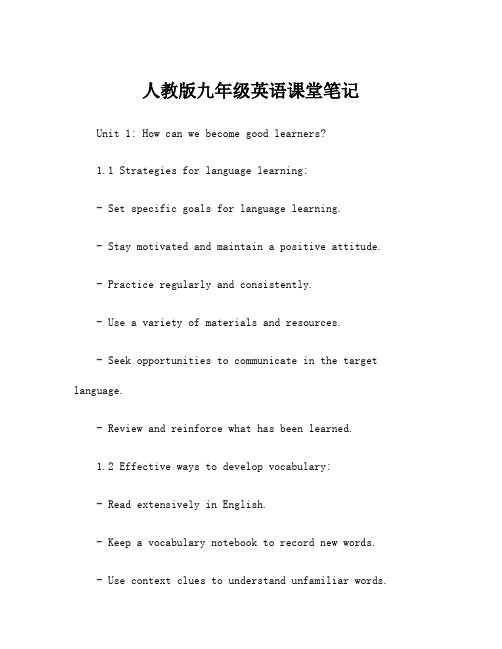
人教版九年级英语课堂笔记Unit 1: How can we become good learners?1.1 Strategies for language learning:- Set specific goals for language learning.- Stay motivated and maintain a positive attitude.- Practice regularly and consistently.- Use a variety of materials and resources.- Seek opportunities to communicate in the target language.- Review and reinforce what has been learned.1.2 Effective ways to develop vocabulary:- Read extensively in English.- Keep a vocabulary notebook to record new words.- Use context clues to understand unfamiliar words.- Use flashcards or online tools for vocabulary practice.- Review and revise vocabulary regularly.- Apply learned words in speaking and writing.1.3 Skills for reading comprehension:- Skim the text to get a general idea.- Scan for specific information.- Pay attention to headings, subheadings, and formatting.- Look for context clues to understand unfamiliar words.- Make predictions and infer meaning from context.- Summarize the main points of the text.1.4 Strategies for listening comprehension:- Pay attention to the speaker's body language and facial expressions.- Focus on keywords and phrases.- Take notes while listening.- Ask questions for clarification.- Practice listening to a variety of accents and speech speeds.- Listen to authentic materials, such as podcasts or videos.1.5 Techniques for effective note-taking:- Use abbreviations and symbols to save time.- Write down key information and main ideas.- Organize information using headings and subheadings.- Use diagrams or mind maps to visualize information.- Review and revise notes after the lecture or class.- Highlight important points or concepts.1.6 Strategies for overcoming difficulties:- Seek help from teachers or classmates when facing challenges.- Break tasks into smaller, manageable parts.- Develop a growth mindset and believe in one's potential.- Practice self-reflection and learn from mistakes.- Find strategies or techniques that work best for individual learning styles.- Stay persistent and persevere through difficult times.Unit 2: Why don't you get her a ticket to the concert?2.1 Making suggestions and offers:- Why don't you...?- How about...?- I suggest...- Would you like me to...?- Do you want...?- Let's...2.2 Expressing preferences:- I prefer...- I'd rather...- I'm more interested in...- I'm not really into...- I'd love to...- I'm not keen on...2.3 Giving and asking for advice: - You should...- It would be a good idea to... - Have you thought about...?- What do you recommend?- What's your opinion on...?- Can you give me any advice on...?2.4 Responding to advice and suggestions:- That's a great idea!- I'll definitely consider it.- I'm not sure about that.- I don't think it's a good option.- Thanks for the suggestion, but I think I'll pass. - I'll think it over and let you know.2.5 Talking about possible outcomes:- If you go to the concert, you'll have a great time. - If you study hard, you'll get good grades.- If it rains, we'll have to stay indoors.- If she misses the bus, she'll be late for school. - If we leave now, we'll catch the train.- If you don't hurry, you'll miss the deadline.2.6 Offering alternatives:- Instead of going to the movie, we could go bowling.- If you don't like pizza, we can order Chinese food.- Rather than taking the bus, you could ride your bike.- If she can't attend the party, we'll invite someone else.- In case of bad weather, we can have the picnic indoors.- If the store is closed, we'll try another one.。
九年级人教版英语学习笔记完整版
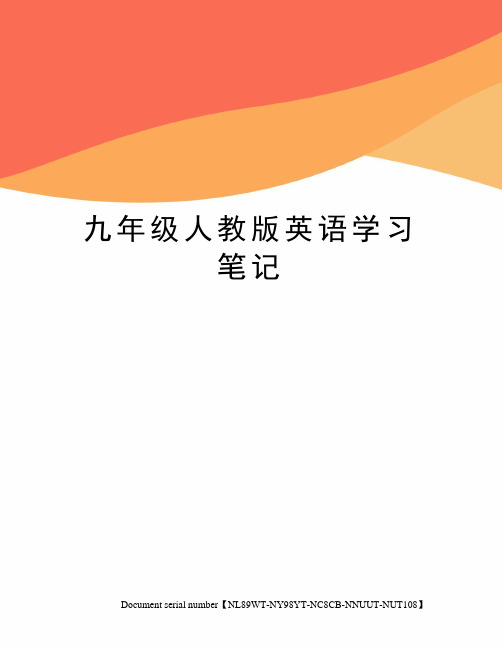
九年级人教版英语学习笔记Document serial number【NL89WT-NY98YT-NC8CB-NNUUT-NUT108】Unit1Howcanwebecomegoodlearners1、How引导的特殊疑问句:①询问方式或手段:“怎样”如:HowdoyoustudyEnglish?---Istudybyreadingaloud.②用于彼此间打招呼、问候、询问身体状况:如:Howdoyoudo---HowdoyoudoHowareyou---I’mfine/well/Ok.③询问天气或程度:如:How’stheweather=What’stheweatherlike?----It’ssunny/cloudy/raining.④询问年龄:如:Howoldisshe=What’sherage?---Sheis15(yearsold)⑤征求意见或建议用:Howabout=Whatabout+n/代词/V-ing.如:Howabout_______(play)basketball?⑥询问频率用:Howoften如:Howoftendoyouexercise---Onceaday.⑦询问可数名词的数量用:Howmany如:Howmanystudentsarethereinyourclass?---Thereare50studentsinourclass⑧询问不可数名词的数量用:Howmuch.如:Howmuchmeat____(be)thereinthefridge?---Onlyalittle.此外:Howmuch还可以用于询问价格。
Howmuchisyourcoat---It’s50yuan.注:询问价格用:Howmuchis/aresth=What’sthepriceofsth东西有贵(expensive=dear)贱(cheap=inexpensive),价格(price)有高(high)低(low)如:Thiscoatisverycheap. Thepriceofthiscoatisverylow.⑨询问次数用:Howmanytimes“多少次”如:Howmanytimesdoyougototheparkaweek?----Threetimes.⑩询问长度、时间长短用:Howlong如:Howlongistheboat----About3meters.Howlongwillyoustaythere?---For2days注:用Howlong提问,用:For+时间段或since+时间点回答(其中,for可以省略)。
人教版九年级英语笔记整理
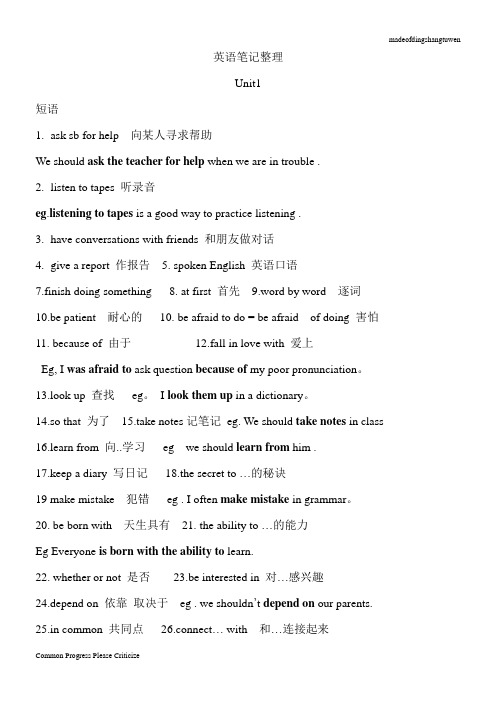
英语笔记整理Unit1短语1.ask sb for help 向某人寻求帮助We should ask the teacher for help when we are in trouble .2.listen to tapes 听录音eg.listening to tapes is a good way to practice listening .3.have conversations with friends 和朋友做对话4.give a report 作报告5. spoken English 英语口语7.finish doing something 8. at first 首先9.word by word 逐词10.be patient 耐心的10. be afraid to do = be afraid of doing 害怕11. because of 由于12.fall in love with 爱上Eg, I was afraid to ask question because of my poor pronunciation。
13.look up 查找eg。
I look them up in a dictionary。
14.so that 为了15.take notes记笔记eg. We should take notes in class16.learn from 向..学习eg we should learn from him .17.keep a diary 写日记18.the secret to …的秘诀19 make mistake 犯错eg . I often make mistake in grammar。
20. be born with 天生具有21. the ability to …的能力Eg Everyone is born with the ability to learn.22. whether or not 是否23.be interested in 对…感兴趣24.depend on 依靠取决于eg . we shouldn’t depend on our parents.25.in common 共同点26.connect… with 和…连接起来eg :Good learners have some good habits in common.27.pay attention to 留心eg。
人教版 九年级英语 unit 1 notes
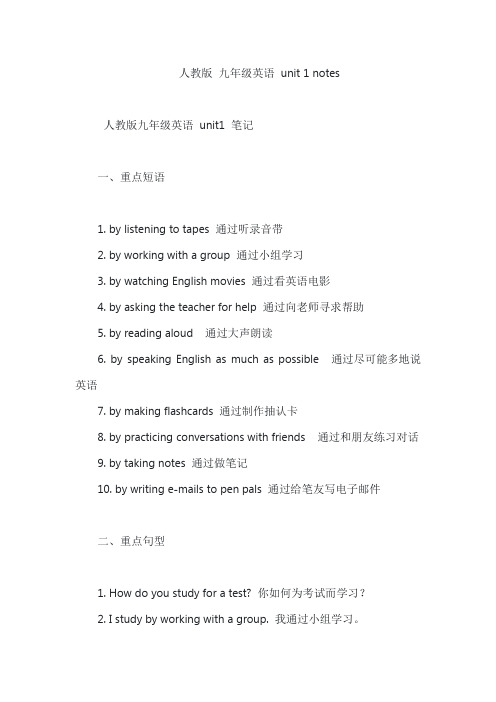
人教版九年级英语unit 1 notes人教版九年级英语unit1 笔记一、重点短语1. by listening to tapes 通过听录音带2. by working with a group 通过小组学习3. by watching English movies 通过看英语电影4. by asking the teacher for help 通过向老师寻求帮助5. by reading aloud 通过大声朗读6. by speaking English as much as possible 通过尽可能多地说英语7. by making flashcards 通过制作抽认卡8. by practicing conversations with friends 通过和朋友练习对话9. by taking notes 通过做笔记10. by writing e-mails to pen pals 通过给笔友写电子邮件二、重点句型1. How do you study for a test? 你如何为考试而学习?2. I study by working with a group. 我通过小组学习。
3. It’s too hard to understand the voices. 声音太难听懂了。
4. What about reading aloud to practice pronunciation? 大声朗读来练习发音怎么样?5. I have a lot of trouble memorizing new words. 我在记新单词方面有很多困难。
6. I find it easy to learn English. 我发现学习英语很容易。
三、词语辨析1. too...to... 太……而不能……,表否定so...that... 如此……以至于……,表肯定例:He is too young to go to school. 他太小了以至于不能去上学。
九年级上册英语人教版笔记

九年级上册英语人教版笔记一、Unit 1 How can we become good learners?1. 重点单词。
- aloud:adv. 大声地;出声地。
例如:Read aloud so that we can all hear you.(大声朗读以便我们都能听到你。
)- pronunciation:n. 发音;读音。
Your pronunciation is very good.(你的发音很好。
)- patient:adj. 有耐心的;n. 病人。
Be patient with children.(对孩子们要有耐心。
)- expression:n. 表达(方式);表示。
Facial expressions can show our feelings.(面部表情能展示我们的感受。
)2. 重点短语。
- by doing sth.:通过做某事。
We can improve our English by reading English books.(我们可以通过读英语书提高英语。
)- make mistakes:犯错。
Everyone makes mistakes when they learn something new.(每个人在学习新东西的时候都会犯错。
)- look up:查阅;抬头看。
Look up the new word in the dictionary.(在词典里查阅这个新单词。
)3. 重点句型。
- How do you study for a test?(你如何为考试而学习?)- I study by working with a group.(我通过小组合作来学习。
)- The more you read, the faster you'll be.(你读得越多,你就会读得越快。
)二、Unit 2 I think that mooncakes are delicious!1. 重点单词。
九年级下册英语笔记人教版
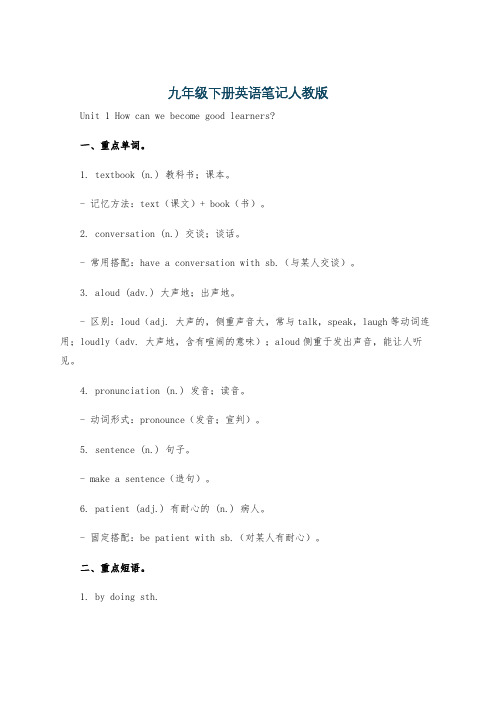
九年级下册英语笔记人教版Unit 1 How can we become good learners?一、重点单词。
1. textbook (n.) 教科书;课本。
- 记忆方法:text(课文)+ book(书)。
2. conversation (n.) 交谈;谈话。
- 常用搭配:have a conversation with sb.(与某人交谈)。
3. aloud (adv.) 大声地;出声地。
- 区别:loud(adj. 大声的,侧重声音大,常与talk,speak,laugh等动词连用;loudly(adv. 大声地,含有喧闹的意味);aloud侧重于发出声音,能让人听见。
4. pronunciation (n.) 发音;读音。
- 动词形式:pronounce(发音;宣判)。
5. sentence (n.) 句子。
- make a sentence(造句)。
6. patient (adj.) 有耐心的 (n.) 病人。
- 固定搭配:be patient with sb.(对某人有耐心)。
二、重点短语。
1. by doing sth.- 意思:通过做某事。
例如:You can improve your English by reading English books.(你可以通过读英语书提高英语水平。
)2. make mistakes.- 意思:犯错。
例如:Everyone makes mistakes when they learn something new.(每个人在学习新东西的时候都会犯错。
)3. look up.- 意思:(在词典、参考书中或通过电脑)查阅;抬头看。
例如:Look up the word in the dictionary if you don't know it.(如果你不认识这个单词就查字典。
)三、重点句型。
1. What about reading aloud to practice pronunciation?- 分析:What about...? 用于提出建议或征求意见,其后接名词、代词或动名词形式。
- 1、下载文档前请自行甄别文档内容的完整性,平台不提供额外的编辑、内容补充、找答案等附加服务。
- 2、"仅部分预览"的文档,不可在线预览部分如存在完整性等问题,可反馈申请退款(可完整预览的文档不适用该条件!)。
- 3、如文档侵犯您的权益,请联系客服反馈,我们会尽快为您处理(人工客服工作时间:9:00-18:30)。
人教版九年级英语笔记整理Unit 1: Phrases1.Ask someone for help - to XXXXXX: When we face difficulties。
we should ask the teacher for help.2.XXX - XXXXXX: Listening to tapes is an effective way to XXX.3.Have ns with friends - XXX friendsXXX: We can XXX.4.Give a report - to present n to an audienceXXX: In class。
we may be required to give a report on a chosen topic.5.Spoken English - the use of language in XXX7.Finish doing something - to complete a task or activityXXX: XXX before I go to bed.8.At first - initiallyXXX: At first。
I found it challenging to learn a new language.9.Word by word - one word at a timeXXX: When XXX。
it's important to take it word by word.10.Be patient - XXXXXX: Learning a new language takes time。
so it's XXX.11.Because of - as a result ofXXX: I was afraid to XXX.12.Fall in love with - to XXXXXX: I fell in love with the culture and language of the country I visited.13.Look up - to search for nXXX: I had to look up the meaning of a new word in the nary.14.So that - in order toXXX: I study hard so that I can XXX.15.Take notes - to write down important nXXX: It's helpful to take notes during XXX.16.Learn from - to gain knowledge or XXXXXX: We can learn a lot from XXX.17.Keep a diary - to record daily thoughts and XXXXXX: XXX.18.The secret to - the key to achieving somethingXXX: The secret to learning a new language is consistent practice.19.Make mistakes - to have errors or faultsXXX: It's normal to make mistakes when learning a new language.20.Be born with - to possess a XXXXXX: Some people are born with a talent for music.21.The ability to - the capacity or skill to do somethingXXX: XXX.22.Whether or not - regardless of whetherXXX: XXX.23.Be interested in - to have a XXX somethingXXX: I am XXX.24.Depend on - to rely on or be XXXXXX: XXX.25.In common - shared characteristics or traitsXXX: We have a lot in common with people who share our interests.26.Connect。
with - to link or XXXXXX: Learning a new language can help connect us with people from different backgrounds.Please review and critique the following article。
Remove any us formatting errors and delete XXX。
make XXX.XXX: Making Progress XXXIn our journey towards success。
XXX。
with the right mindset and attitude。
we XXXXXX each other。
By doing so。
we can make common progress.For example。
when XXX struggling with a task。
we can offer our help and expertise。
This not only benefits the person in need but also helps us to XXX。
when we share our successes and failures with others。
we can learn from each other's experiences and avoid making the same mistakes.It is XXX that progress is not always linear。
Sometimes。
we may take a step back before moving forward。
However。
as long as we XXX。
XXX.In order to make common progress。
we must also be XXX criticism。
Constructive criticism can help us to XXX upon them。
It is XXX.In n。
making progress together requires a positive attitude。
a willingness to help others。
and the XXX。
we XXX common progress and success。
Rewritten:XXX: Achieving Success XXXAs we strive towards success。
we may face XXX。
with a positive mindset and supportive attitude。
we XXX our goals。
One way to achieve this is by working together and supporting each other。
which leads to common progress.XXX with a task。
we can offer our help and XXX not onlythe person in need but also helps us XXX。
by sharing our successes and failures。
we can learn from each other's experiences and avoid making the same mistakes.It is XXX that progress is not always linear and XXX。
XXX。
XXX.To achieve common progress。
we must also be XXX constructive criticism。
Criticism can help us XXX upon them。
Itis XXX.In n。
XXX。
a willingness to help others。
and the XXX。
we XXX common progress and success.1."Used to" XXX ns。
for example。
"I used to be short."2."Be used to doing" means being accustomed to doing something。
for example。
"I am used to getting up early."3."Be used to do" means something is used for a certain purpose。
for example。
"Cars are used to drive."4.An object clause that ns as the object of a sentence is called an object clause。
It has three elements: the n。
the tense。
and the word order。
"Whether" is used for general ns。
while interrogative pronouns like "what" and "how" are used for specific ns.5.When the main clause is in the present tense。
any tense can be used in the object clause。
When the main clause is in the past tense。
